Abstract
Oxidative stress is imparted by a varying range of environmental factors involving heavy metal stress. Thus, the mechanisms of antioxidant resistance may advance a policy to improve metal tolerance. Lead as a toxic heavy metal negatively affects the metabolic activities and growth of medicinal and aromatic plants. This investigation aimed to assess the function of 5-aminolevulinic acid (ALA) in the alleviation of Pb stress in sage plants (Salvia officinalis L.) grown either hydroponically or in pots. Various concentrations of Pb (0, 100, 200, and 400 µM) and different concentrations of ALA (0, 10, and 20 mg L−1) were tested. This investigation showed that Pb altered the physiological parameters. Pb stress differentially reduced germination percentage and protein content compared to control plants. However, lead stress promoted malondialdehyde (MDA) and H2O2 contents in the treated plants. Also, lead stress enhanced the anti-oxidative enzyme activities; ascorbate peroxidase superoxide, dismutase, glutathione peroxidase, and glutathione reductase in Salvia plants. ALA application enhanced the germination percentage and protein content compared to their corresponding controls. Whereas, under ALA application MDA and H2O2 contents, as well as the activities of SOD, APX, GPX, and GR, were lowered. These findings suggest that ALA at the 20 mgL−1 level protects the Salvia plant from Pb stress. Therefore, the results recommend ALA application to alleviate Pb stress.
1. Introduction
Plants are immobile in their nature, and they are subjected to various abiotic and biotic stresses. Therefore, they develop different strategies to cope with stress conditions and mitigate the toxic effect. Heavy metals are toxic pollutants that are tough to eliminate and small quantities can cause an unlimited threat to the environment [1]. Heavy metals produce oxidative stress and desiccation in plants, which result in the reduction of the yield and corrosion in the crop quality [2,3,4]. Photosynthesis and PSII are sensitive to heavy metals and particularly lead stress. The high concentration of lead can cause a number of poisonous symptoms in plants including negative effects on photosynthesis. Lead effects have been illustrated for both donor and acceptor sites of photosynthesis-2 (PS II), the cytochrome b/f complex, and photosynthesis-1 (PSI). It is commonly known that the PSI electron transport process is less sensitive to inhibition by lead than photosynthesis-2 (PSII) [5,6].
Lead is the most abundant hazardous metal in the environment, where it is not an essential nutrient for plants, and it is regarded as a toxic heavy metal due to its widespread distribution and its extensive environmental and human health problems [7]. Pb(NO3)2 is a causal source of pollution in ecosystems [8]. Its major sources are chimneys of factories, pesticides, fertilizers, and exhausts of automobiles [9]. Lead accumulation is recognized to cause highly deleterious effects on the growth and yield of plants [10], where it was reported to induce the production of reactive oxygen species (ROS) and cause oxidative damage to nucleic acids, proteins, and lipids [11,12] also, Pb-induced ROS scavenging enzymes in plants [13,14].
The plant growth hormones are often used to relieve abiotic stress in plants. ALA is considered one of the most vigorous plant growth regulators and the first compound in the pathway of porphyrin synthesis, which leads to the speeding up of the synthesis of chlorophyll in plants [15]. It has been found that ALA performs a crucial part in sustaining optimum plant growth and it improves crop yields [16]. ALA is known to stimulate plant development and reactions to several stresses [17,18]. It was found that ALA induces stress tolerance [19,20] and revival of growth under herbicide stress [21].
Salvia officinalis L. (sage) belongs to the Family Lamiaceae. This species is native to the Middle East and Mediterranean areas and recently it has been naturalized throughout the world particularly in Europe and North America [22,23]. It is used in folk medicine as herbal tea and antiseptic, antihydrotic, and anti-inflammatory medicine where it has curative properties for ulcers, gout, dizziness, rheumatism, hyperglycemia, and seizures [24,25]. Also, it is used as a food additive as dried leaves [26]. For all these fantastic medicinal and cookery potentialities, S. officinalis is cultivated and many Mediterranean countries, where sage grows, have substantial gains from its production and export [27]. Lead is counted as a strong environmental pollutant. Different ecological, evolutionary, and environmental processes in the microsphere are disordered because of lead toxicity to the microbial community. Based on this vital evaluation, the effects of increasing doses (control, 100, 200, and 400 µM) of lead nitrate as heavy metal on seed germination and the antioxidant capacity of sag seedlings were investigated. Also, the present work aimed to investigate the influence of ALA on the mitigation of lead toxicity in sage plants.
2. Materials and Methods
2.1. Plant Material
Laboratory and greenhouse experiments using pots were designed. The seeds of Salvia officinalis L. were obtained from the Medicinal and Aromatic Plants, Department of Horticulture Research Institute, Agriculture Research Center, Egypt and selected for apparent uniformity in size and shape.
2.2. Germination of Salvia officinalis Seeds
The seeds of Salvia were germinated as described by the authors of [28]. Healthy seeds were surface treated with a 0.5% (v/v) aqueous solution of HgCl2 for 1–2 min followed by repeated washing with distilled water. The seeds were divided into three groups and raised on moist filter paper in Petri dishes. The first group was soaked in distilled water as a control. The second group was primed in 10 mgL−1 ALA solution for 12 h. The third group was primed in 20 mgL−1 ALA solution for the same period of time. Each group of primed seeds was divided into three sub-groups to be watered for 7 days with Hoagland solution [29] containing 100, 200, and 400 µM of Pb(NO3)2. For the pot experiment, the seeds were germinated in small plastic pots with sandy soil. Seeds were considered to be germinated on the first appearance of the radicle. Germination % = Number of germinated seeds/Total number of seeds [30].
2.3. Treatment of Salvia officinalis Seedlings with Pb(NO3)2
The non-primed seeds (control) and the ones primed in 10 or 20 mgL−1 ALA were left to germinate for days in sterile Petri dishes or in plastic pots with sandy soil of 70% relative activity. All seeds were watered with Hoagland solution free from Pb(NO3)2 for 7 days. Each group of primed seeds in 10 or 20 mgL−1 ALA was then divided into three sub-groups. The first sub-group was transported to a Hoagland solution with 100 µM Pb(NO3)2. The second sub-group was transferred to a Hoagland solution with 200 Pb(NO3)2 and the third sub-group was shifted to a Hoagland solution with 400 µM Pb(NO3)2. All sub-groups of seedlings were left to grow for 14 days in a growth chamber under controlled conditions (12:12 day/night, 25/30 °C±2, and photon flux density of 95 µmol m2s−1. The hydroponic system was continuously aerated using an air pump and the solution was renewed each 48 h.
2.4. Preparation of Leaf Extract of Salvia officinalis
Samples of plant leaves were weighed and homogenized in a pestle and motor with extraction buffer (pH 7.0) then centrifuged for 10 min at 10,000× g rpm. The obtained supernatant represented the plant leaf extract.
2.5. Determination of Total Soluble Protein (TSP) Content
The TSP content of leaves of Salvia officinalis L. was determined by the method in Ref. [31]. A sample of 30 μL of leaf extract was added to a tube and the volume was made up to 100 μL with 0.15 M NaCl. Then, 1 mL of Bradford’s reagent was added and mixed well and the absorbance at 595 nm was determined. The protein concentration in the sample using the calibration curve of bovine serum albumin (BSA) as a standard was measured.
2.6. Determination of MDA Content
Lipid peroxidation was investigated by the estimation of the malondialdehyde (MDA) content by the method in Ref. [32]. Samples (200 mg) of the frozen leaves were ground in 3 mL of 0.2% (w/v) TCA and then centrifuged. A sample (0.2 mL) of the resulting supernatant was combined with 2 mL of 25% (w/v) TCA including 0.4% thiobarbituric acid (TBBA) and incubated for 35 min at 95 °C. The mixture was cooled in an ice bath and then centrifuged at 10,000× g rpm for 15 min. The absorbance was recorded at 532 nm.
2.7. Determination of Hydrogen Peroxide Content
Determination of H2O2 content was carried out following Ref. [33]. A sample (0.5 g) of plant leaves was homogenized with liquid nitrogen then suspended in chilled 5 mL of 0.1% (w/v) TCA. The homogenate was then centrifuged at 13,000× g rpm for 20 min. A sample of 0.5 mL of supernatant was mixed with 0.5 mL of 10 mM potassium phosphate buffer (pH 7.0) and 1 mL of M KI. The reaction was left for 1 h in darkness followed by measuring the absorbance at 390 nm. H2O2 concentration was determined by using a standard curve.
2.8. Determination of Antioxidant Enzyme Activity
2.8.1. Preparation of Enzymes Extract
Enzyme extract was prepared Ref. [34] where one gm of fresh leaves from control and treated plants was homogenized with 4 mL of 150 mM phosphate buffer (pH 7.0) containing 1 mM polyvinylpyrrolidone (1%) and 1 mM EDTA followed by centrifuging at 15,000× g rpm at 4 °C for 25 min. The resulting supernatant represented the crude extract for the enzymes assay.
2.8.2. Assay of Enzymes
Assay of Ascorbate Peroxidase (APX, EC: 1.11.1.11)
The activity of ascorbate peroxidase (APX) was determined by the method in Ref. [35]. It is a spectrophotometric method where the rate of decrease in absorbance of ascorbate during its oxidation is measured at 290 nm wavelength. Half gram of plant leaves was mixed with 10 mL of phosphate buffer (50 mM pH 7.5) comprising 0.3 mM EDTA and homogenized in a pestle and mortar followed by centrifuging for 25 min at 10,000× g rpm at 4 °C.
The supernatant was transported to another tube and used as enzyme extract. The enzyme was assayed in 1 mL cuvette containing 350 µM ascorbate, 0.5 mM EDTA, 2 mM H2O2, 100 mM potassium phosphate buffer (pH 7.0), and 100 µL enzyme extract. The rate of reduction in absorbance at 290 nm in the course of ascorbate oxidation was read.
Assay of Glutathione Peroxidase (GPX, EC: 1.11.1.9)
Glutathione peroxidase (GPX) activity was estimated by [36]. Plant extract (50 µL), 3 mL of extraction buffer (pH 7.5), 0.3 mL of sodium azide and 0.2 mL EDTA were mixed. Glutathione (2 mL) and 0.2 mL of H2O2 were included in the mixture and incubated at 37 °C for 10 min followed by termination of the reaction after 15 min by 0.5 mL of 10% TCA. The samples were then centrifuged. The supernatant was assayed for glutathione as mentioned previously.
Assay of Superoxide Dismutase (SOD, EC: 1.15.1.1)
SOD activity was determined following Ref. [37]. The assay is based on its capacity to hinder the photochemical reduction of the nitro blue tetrazolium (NBT). The assay mixture (3 mL) contained 100 mM phosphate buffer (pH 7.8), 20 mM methionine, 520 µM NBT, 10 µM EDTA, 30 µM of riboflavin, a sample (50 µL) of the enzyme extract, and 300 µL the reaction was allowed to stand 20 min under 4000 lx light. The absorbance was taken at 560 nm.
Assay of Glutathione Reductase (GR, EC: 1.6.4.2)
GR assay was carried out according to Ref. [38] by measuring the reduction in absorbance at 334 nm due to NADPH oxidation. The assay mixture of 3.0 mL contained 1 mM oxidized glutathione (GSSG), 2 mM EDTA, 150 mM extraction buffer (pH 7.5), 0.4 mM NADPH, and 100 µL enzyme preparation at 30 °C.
2.9. Statistical Analysis
The experimental design was randomized completely. All values represent the mean of four replicates. Data were exposed to ANOVA and examined by Duncan’s multiple range tests at 0.05 probability level using the COSTAT 6.3 program. Values represent the mean ± SD (n = 3). Means monitored by the similar letter did not significantly vary at p ≤ 0.05 fitting to Duncan’s multiple range tests.
3. Results
The data in Figure 1A,B indicate that the germination percentage of Salvia officinalis seeds in hydroponic and in pot experiments were decreased gradually with an increase in the concentration of Pb(NO3)2 (100, 200, and 400 µM). The germination percentage of S. officinalis seeds in Petri dishes treated with 400 µM solution was 19.33% and 23.33% at both Hoagland’s nutrient solutions and pot experiments, respectively.
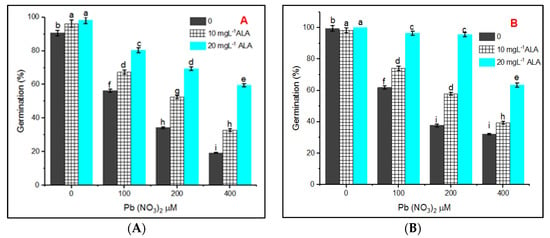
Figure 1.
Effect of various concentrations of Pb(NO3)2 on seed germination of Salvia officinalis and stress alleviation by ALA in hydroponic (A) and pot experiments (B).
Priming seeds in 10 or 20 mg L−1 of ALA, the application of ALA increased the percentage of germination of S. officinalis seeds under all the tested concentrations of Pb (100, 200, and 400 µM) in both experiments. ALA at 20 mgL−1 was most effective in the alleviation of lead stress compared to 10 mgL−1 of ALA.
The results represented in Figure 2A,B showed that the total soluble protein content in S. officinalis leaves grown in hydroponic and in pot experiments was reduced under the various tested concentrations of Pb and the reduction was concentration-dependent. Alleviation of Pb stress in S. officinalis plants in hydroponic or pot experiments was dependent on ALA concentration.
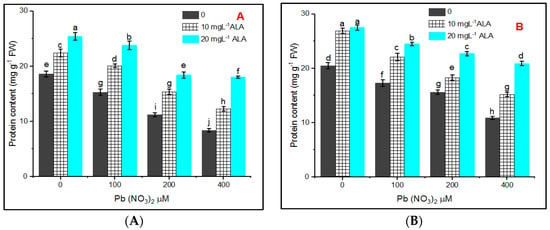
Figure 2.
Effect of various concentrations of Pb(NO3)2 on total soluble protein content in leaves of Salvia officinalis and stress alleviation by ALA in hydroponic (A) and pot experiment (B).
Lipid peroxidation (MDA) as a marker of stress was determined to investigate the oxidative stress in S. officinalis under Pb treatment. The illustrated data in Figure 3A,B indicated a low level of MDA in control plants, however, in Pb-treated plants, MDA increased gradually depending on the concentrations of Pb. The highest value was recorded under treatment with 400 µM Pb concentration. Application of ALA resulted in reducing H2O2 contents by 18.57% and 34.96% in hydroponic as well as 16.84% and 30% in pot experiment at 10 and 20 mg L−1 level of ALA.
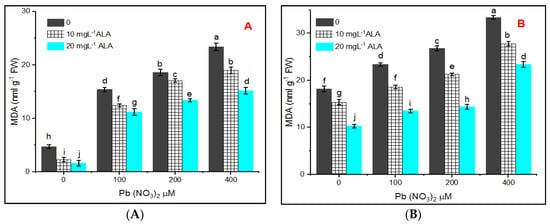
Figure 3.
Effect of various concentrations of Pb(NO3)2 on MDA content in leaves of Salvia officinalis and stress alleviation by ALA in hydroponic (A) and pot experiment (B).
Production of both hydrogen peroxide (H2O2 and MDA) was increased apparently in response to Pb stress, and the increase was significantly counteracted by priming in ALA. The obtained results indicated the presence of low concentrations of H2O2 in plants whose seeds were treated with water, 10 and 20 mgL−1 of ALA (Figure 4A,B).
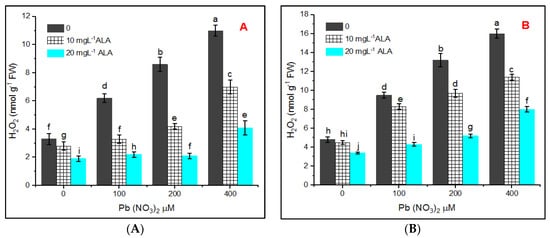
Figure 4.
Effect of various concentrations of Pb(NO3)2 on H2O2 content in leaves of Salvia officinalis and stress alleviation by ALA in hydroponic (A) and pot experiment (B).
However, H2O2 increased gradually under Pb treatments in a concentration-dependent manner. The highest contents of H2O2 in leaves of treated plants were 11.0 and 16.00 nmol g−1 FW at 400 µM Pb in hydroponic and pot experiments, respectively. Priming of S. officinalis seeds in 10 or 20 mgL−1 of ALA resulted in partial alleviation of Pb stress.
The alleviation of lead toxicity was represented by 29.07% and 50.09% in the presence of 10 or 20 mg L−1 of ALA, respectively. Pb stress potentially disturbed the enzymatic activities of S. officinalis plants. This experiment indicated an appreciable activity of ascorbate peroxidase (APX) in the control plants (Figure 5A,B).
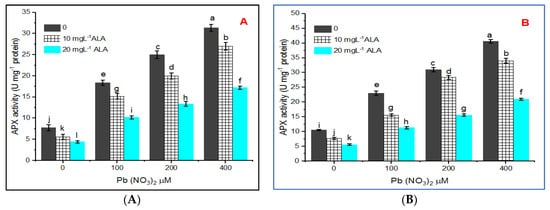
Figure 5.
Effect of various concentrations of Pb(NO3)2 on APX activity of Salvia officinalis leaves and stress alleviation by ALA in hydroponic (A) and pot experiment (B).
However, APX increased progressively with increasing Pb concentrations in the leaves of S. officinalis plants whose seeds were primed or not primed in ALA. The highest activities were 31.43 and 40.57 units mg−1 protein in hydroponic and pot experiments, respectively. In the treatment with 400 µM of Pb, the increase was about five times that of the control. Priming seeds in ALA decreased APX activity and the ameliorative role of ALA was more apparent with 10 than 20 mg L−1 in hydroponic and pot experiments.
Regarding the activity of glutathione peroxidase (GPX), it takes place in the same manner as the other antioxidant enzymes. As indicated in Figure 6A,B, GPX increased under treatments with Pb at various concentrations. Priming seeds in ALA lowered the activity of the GPX enzyme and 20 mg L−1 of ALA was more effective than 10 mg L−1. This was recorded for plants grown in hydroponic and pot experiments.
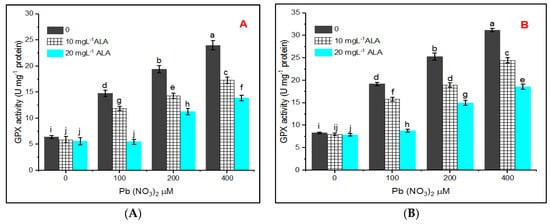
Figure 6.
Effect of various concentrations of Pb(NO3)2 on GPX activity of Salvia officinalis leaves and stress alleviation by ALA in hydroponic (A) and pot experiment (B).
Concerning superoxide dismutase (SOD), the results illustrated in Figure 7A,B showed that low activity was observed in control plants and enhanced under Pb treatment with various concentrations. However, SOD increased continuously with increasing the concentration of Pb. The highest activities of SOD were 34.0 and 38.37 units mg−1 protein recorded at 400 µM Pb in hydroponic and pot experiments, respectively.
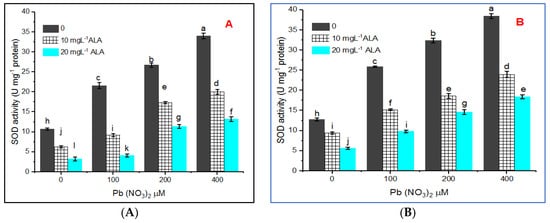
Figure 7.
Effect of various concentrations of Pb(NO3)2 on SOD activity of Salvia officinalis leaves and stress alleviation by ALA in hydroponic (A) and pot experiment (B).
ALA either at 10 or 20 mg L−1 ameliorated partially the induced stress by Pb treatments on Salvia plants and this was apparent by the lowered activity of SOD under the treatments with various concentrations of Pb. The enzyme activities were decreased by 41.09% and 61.26% under Pb 400 µM treatment in hydroponic experiments with 10 and 20 mg L−1 ALA. Also, SOD activity was lowered by 37.45 and 52.12% in pot experiments under Pb 400 µM at ALA 10 and 20 mg L−1 level, respectively.
The results indicated in Figure 8A,B showed that GR activity increased under all Pb treatments. However, ALA treatment lowered the GR activity, lowering in the rate of activity at 20 mg L−1 ALA was higher than that recorded at 10 mg L−1 of ALA.
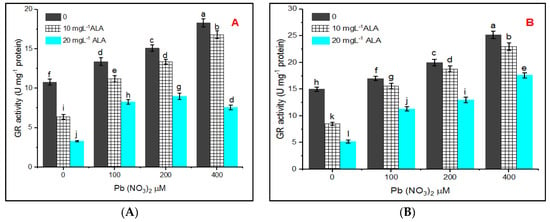
Figure 8.
Effect of various concentrations of Pb(NO3)2 on GR activity of Salvia officinalis leaves and stress alleviation by ALA in hydroponic (A) and pot experiments (B).
4. Discussion
The results obtained in the present study showed that the treatment of Salvia officinalis with Pb (0, 100, 200, 400 µM) showed a considerable alteration in the measured physiological parameters in both hydroponic and pot experiments. Thus, there is a reduction in the percentage of seed germination of S. officinalis, which may be attributed to the fact that Pb treatment reduced the rate of cell metabolic processes such as cell division, nucleic acid synthesis [39] and Pb impaired seedling development, as well as chlorophyll production [40]. In addition, increasing levels of Pb in soil inhibited the germination of seeds and affected the plant metabolism [41].
On the other hand, plant growth was improved under the combined treatment of ALA (10 and 20 mg L−1) and Pb stress. This increase in seed germination with ALA might be owing to the fact that ALA has an enhancing effect in regulating various metabolic processes, due to this behavior, the growth and yield of most plants under abiotic stresses have been improved [42]. It has been reported that ALA improved plant growth by alleviating cadmium [43] and lead effects in oilseed rape (Brassica napus).
The present results regarding total soluble protein (TSP) revealed that there is a decline in TSP content with increasing Pb concentration in untreated sage plants with ALA. Tamás et al. [44] and El-Shora et al. [45] reported that Pb treatment reduced protein content, which may be attributed to oxidative modifications by ROS [46] produced under Pb stress [47,48,49]. Also, priming seeds in ALA possibly increases the defense system through induction of antioxidant synthesis [50].
The data indicated that S. officinalis treated with both concentrations of ALA before Pb treatment showed an increase in MDA content comparing to the control. These results are in harmony with the fact that plants grown under stressed conditions create free radicals leading to lipid peroxidation of membranes and increasing MDA content [51,52]. Lipid peroxidation is a biochemical marker for the free radical-mediated injury with increasing lead concentration in Talinum triangulare leaves [53,54]. MDA is responsible for cell membrane damage, and it is one of the final products of peroxidation of unsaturated fatty acids in phospholipids [55]. In lipid peroxidation, the free radicals take away electrons from membrane lipid leading to cell membrane damage [56].
The level of ALA in plants originated from primed seeds in water or ALA expressed lower content of H2O2 compared to those treated with various concentrations of Pb. The increase in H2O2 content as one of ROS in Salvia leaves under Pb treatments, whether in hydroponic or pot experiments, reflected the oxidative stress stimulated by Pb and these results agreed with those reported by the authors of [57] and might be due to the destabilization of membranes by increasing Pb levels. It has been reported that ROS were produced under stress conditions and are eliminated by antioxidant systems [58]. Pb toxicity enhances the ROS production in mitochondria, chloroplasts, and peroxisomes [59]. Rasheed et al. [60] reported that application of ALA diminishes the levels of both MDA and H2O2 and consequently reduces the oxidative damage in sunflower subjected to water stress.
Higher plants have an antioxidant system that diminishes oxidative stress. This system involves antioxidant enzymes that support plants with adaptation and survival under various stresses and oxidative damage [61,62]. The results reveal a higher level of antioxidant activities in plants whose seeds were primed in ALA at 10 and 20 mg L−1 than those of the control plants. It seems likely that ALA enhanced the activities of the various enzymes of ROS hunting. In plants grown from seeds primed in ALA and treated with Pb, the activities of the four estimated antioxidant enzymes (APX, GPX, SOD, and GR) improved continuously but with slower rates compared to the plants grown from seeds primed in water possibly because Pb concentrations seem likely to be high.
Ascorbate peroxidase (APX) is located in chloroplasts as well as cytosol and represents a key enzyme in the ascorbate cycle where it exchanges H2O2 by negotiation of ascorbate as an electron donor and formation of H2O [63]. In this study, APX activity increased under treatment with Pb depending on the concentration, which indicates its role in the defense mechanism under stress. Regarding GPX, its activity increased under Pb stress in the present investigation, and this is in harmony with the results of [64], where GPX is involved in removing ROS production under stress.
The increment in the SOD activity in the present work under lead stress is probably due to the reduction of superoxide radicals [65]. Superoxide radicals are considered to be the first radicals produced under stress, and SOD converts superoxide radicals quickly into H2O2 and O2. Thus, SOD plays an important part in scavenging free radicals [66].
Glutathione reductase (GR) is involved in the AsA-GSH cycle and performs a critical function in scavenging ROS under stress and maintains both AsA and GSH levels in living cells [67].
Various researchers suggested that ALA can alleviate stress through improving antioxidant enzyme activities while scavenging ROS [62,68,69] and this is what the results in the present investigation proved either in hydroponic or pot experiments. The activities of the measured enzymes in plants originated from water-primed seeds were higher than those primed in ALA and then treated with Pb and this might be due to the use of higher Pb concentrations.
Priming of Salvia seeds in 10 or 20 mg L−1 ALA expressed an ameliorative effect on Pb toxicity. ALA is a common precursor of tetrapyrroles as well as a crucial growth regulator in higher plants and has been reported to be effective in improving photosynthesis and alleviating the adverse effects of various abiotic stresses in higher plants such as salinity stress in cucumber seedlings [70]. It has been described that ALA protects seedlings of plants against stress by preventing lipid peroxidation, induction of antioxidant enzyme activities, regulating endogenous hormones in addition to nutrient accumulation [70]. Also, ALA improved the tolerance against salt stress in Isatis indigotica [71].
5. Conclusions
Pb markedly reduced germination and protein content but increased MDA, H2O2 levels, and the antioxidant enzyme activities in S. officinalis (Sage) leaves. Priming seeds in ALA (10 and 20 mg L−1) decreased the levels of both H2O2 and MDA. In addition, it lowered the induced GPX, APX, SOD, and GR under Pb treatment. Hence, priming seeds in ALA is valuable for the alleviation of Pb stress in S. officinalis and possibly in other plants. Nonetheless, more investigations are crucial to evaluate the genuine mechanism of ALA in alleviating the heavy metal (Pb) stress in plants.
Author Contributions
Conceptualization, H.M.E.-S. and S.S.A.; methodology, H.M.E.-S.; software, G.F.M.; validation, H.M.E.-S., S.S.A., and D.B.D.; formal analysis, G.A.E.-S.; investigation, S.S.A.; resources, G.A.E.-S.; data curation, D.B.D.; writing—original draft preparation, H.M.E.-S.; writing—review and editing, S.S.A.; visualization, H.M.E.-S.; supervision, H.M.E.-S.; project administration, G.A.E.-S.; funding acquisition, S.S.A. All authors have read and agreed to the published version of the manuscript.
Funding
This research received no external funding.
Institutional Review Board Statement
Not applicable.
Informed Consent Statement
Not applicable.
Data Availability Statement
Data are available from the authors upon request.
Conflicts of Interest
The authors declare that there are no conflict of interest related to this article.
References
- Yan, A.; Wang, Y.; Tan, S.N.; Mohd Yusof, M.L.; Ghosh, S.; Chen, Z. Phytoremediation: A promising approach for revegetation of heavy metal-polluted land. Front. Plant Sci. 2020, 11, 359. [Google Scholar] [CrossRef] [PubMed]
- Sai, B.; Ali, S.; Farooq, M.A.; Iqbal, N.; Abbas, F.; Ahmad, M. Alleviation of lead toxicity by silicon is related to elevated photosynthesis, antioxidant enzymes suppressed lead uptake and oxidative stress in cotton. J. Biorem. Biodeg. 2013, 4, 187. [Google Scholar] [CrossRef]
- Demarco, C.F.; Afonso, T.F.; Pieniz, S.; Quadro, M.S.; Camargo, F.A.; Andreazza, R. In situ phytoremediation characterization of heavy metals promoted by Hydrocotyle ranunculoides at Santa Bárbara stream, an anthropogenic polluted site in southern of Brazil. Environ. Sci. Pollut. Res. 2018, 25, 28312–28321. [Google Scholar] [CrossRef] [PubMed]
- Fazekašová, D.; Fazekaš, J. Soil quality and heavy metal pollution assessment of iron ore mines in Nizna Slana (Slovakia). Sustainability 2020, 12, 2549. [Google Scholar] [CrossRef] [Green Version]
- Bączek-Kwinta, R.; Antonkiewicz, J.; Łopata-Stasiak, A.; Kępka, W. Smoke compounds aggravate stress inflicted on Brassica seedlings by unfavourable soil conditions. Photosynthetica 2019, 57, 1–8. [Google Scholar] [CrossRef] [Green Version]
- Giannakoula, A.; Therios, I.; Chatzissavvidis, C. Effect of lead and copper on photosynthetic apparatus in citrus (Citrus aurantium L.) plants. The role of antioxidants in oxidative damage as a response to heavy metal stress. Plants 2021, 10, 155. [Google Scholar] [CrossRef] [PubMed]
- Piechalak, A.; Tomaszewska, B.; Barałkiewicz, D. Enhancing phytoremediative ability of Pisum sativum by EDTA application. Phytochemistry 2003, 64, 1239–1251. [Google Scholar] [CrossRef]
- Navabpour, S.; Yamchi, A.; Bagherikia, S.; Kafi, H. Lead-induced oxidative stress and role of antioxidant defense in wheat (Triticum aestivum L.). Physiol. Molec. Biol. Plants 2020, 26, 793–802. [Google Scholar] [CrossRef] [PubMed]
- Dey, U.; Mondal, N.K. Ultrastructural deformation of plant cell under heavy metal stress in Gram seedlings. Cogent Environ. Sci. 2016, 2, 1196472. [Google Scholar] [CrossRef]
- Islam, E.; Liu, D.; Li, T.; Yang, X.; Jin, X.; Mahmood, Q.; Tian, S.; Li, J. Effect of Pb toxicity on leaf growth, physiology and ultrastructure in the two ecotypes of Elsholtzia argyi. J. Hazard. Mater. 2008, 154, 914–926. [Google Scholar] [CrossRef]
- Shahid, M.; Khalid, S.; Abbas, G.; Shahid, N.; Nadeem, M.; Sabir, M.; Aslam, M.; Dumat, C. Heavy metal stress and crop productivity. In Crop Production and Global Environmental Issues; Hakeem, K., Ed.; Springer Int.: Cham, Switzerland, 2015. [Google Scholar]
- Tao, L.; Guo, M.; Ren, J. Effects of cadmium on seed germination, coleoptile growth, and root elongation of six pulses. Pol. J. Environ. Stud. 2015, 24, 295–299. [Google Scholar]
- Mishra, K.K.; Rai, U.N.; Prakash, O. Bio concentration and phytotoxicity of Cd in Eichhornia crassipes. Environ. Monit. Assess 2007, 130, 237–243. [Google Scholar] [CrossRef] [PubMed]
- Zhang, H.; Zhang, L.; Li, J.; Chen, M.; An, R. Comparative study on the bioaccumulation of lead, cadmium and nickel and their toxic effects on the growth and enzyme defense strategies of a heavy metal accumulator, Hydrilla verticillata (L.f.) Royle. Environ. Sci. Pollut. Res. 2020, 27, 9853–9865. [Google Scholar] [CrossRef]
- Otsuka, S.; Matsumoto, K.; Nakajima, M.; Tanaka, T.; Ogura, S.I. Oxygen availability for porphyrin biosynthesis enzymes determines the production of protoporphyrin IX (PpIX) during hypoxia. PLoS ONE 2015, 10, e0146026. [Google Scholar] [CrossRef] [PubMed] [Green Version]
- Habiba, U.; Ali, S.; Rizwan, M.; Hussain, M.; Hussain, A.; Alam, P.; Alqarawi, A.; Hashem, A.; AbdAllah, E. The ameliorative role of 5-aminolevulinic acid (ALA) under Cr stress in two maize cultivars showing differential sensitivity to Cr stress tolerance. J. Plant Growth Regul. 2018, 38, 788–798. [Google Scholar] [CrossRef]
- Gill, R.A.; Ali, B.; Islam, F.; Farooq, M.A.; Gill, M.B.; Mwamba, T.M.; Zhou, W. Physiological and molecular analyses of black and yellow seeded Brassica napus regulated by 5-aminolivulinic acid under chromium stress. Plant Physiol. Biochem. 2015, 94, 130–143. [Google Scholar] [CrossRef] [PubMed]
- Herman, S.; Marco, G.; Cecilia, B.; Alfonso, V.; Luis, M.; Cristin, V.; Sebastin, P.; Sebastin, A. Effect of water availability on growth, water use efficiency and omega 3 (ALA) content in two phenotypes of chia (Salvia hispanica L.) established in the arid Mediterranean zone of Chile. Agric. Water Manag. 2016, 173, 67–75. [Google Scholar] [CrossRef]
- Naeem, M.S.; Rasheed, M.; Liu, D.; Jin, Z.L.; Ming, D.F.; Yoneyama, K.; Takeuchi, Y.; Zhou, W.J. 5-Aminolevulinic acid ameliorates salinity-induced metabolic, water-related and biochemical changes in Brassica napus L. Acta Physiol Plant 2011, 33, 517–528. [Google Scholar] [CrossRef]
- Tian, T.; Ali, B.; Qin, Y.; Malik, Z.; Rafaqat, A.; Ali, S.; Zhou, W. Alleviation of lead toxicity by 5-aminolevulinic acid is related to elevated growth, photosynthesis, and suppressed ultra-structural damages in oilseed rape. BioMed Res. Intern. 2014, 2014, 1–11. [Google Scholar]
- Zhang, W.F.; Zhang, F.; Raziuddin, R.; Gong, H.J.; Yang, Z.M.; Lu, L.; Ye, Q.F.; Zhou, W.J. Effects of 5-aminolevulinic acid on oilseed rape seedling growth under herbicide toxicity stress. J. Plant Growth Regul. 2008, 27, 159–169. [Google Scholar] [CrossRef]
- Bisset, N.G.; Wichtl, M. Herbal Drugs and Phytopharmaceuticals: A Handbook for Practice on a Scientific Basis with Reference to German Commission E Monographs, 2nd ed.; CRC Press: Boca Raton, FI, USA, 2001; pp. 440–443. [Google Scholar]
- Miura, K.; Kikuzaki, H.; Nakatani, N. Apianane terpenoids from Salvia officinalis. Phytochemistry 2001, 58, 1171–1175. [Google Scholar] [CrossRef]
- Kintzios, S.E. Medicinal and aromatic plants—Industrial profiles. In Sage, the Genus Salvia; Harwood Academic Publishers: Amsterdam, The Netherlands, 2000; Volume 14. [Google Scholar]
- Garcia, C.S.C.; Menti, C.; Lambert, A.P.F. Pharmacological perspectives from Brazilian Salvia officinalis (Lamiaceae): Antioxidant, and antitumor in mammalian cells. An. Acad. Bras. Ciências 2016, 88, 281–292. [Google Scholar] [CrossRef] [PubMed] [Green Version]
- Cegiełka, A.; Hać-Szymańczuk, E.; Piwowarek, K.; Dasiewicz, K.; Słowiński, M.; Wrońska, K. The use of bioactive properties of sage preparations to improve the storage stability of low-pressure mechanically separated meat from chickens. Poult. Sci. 2019, 98, 5045–5053. [Google Scholar] [CrossRef]
- Ben Taarit, M.; Msaada, K.; Hosni, K.; Hammami, M.; Kchouk, M.E.; Marzouk, B. Plant growth, essential oil yield and composition of sage (Salvia officinalis L.) fruits cultivated under salt stress conditions. Ind. Crop. Prod. 2009, 30, 333–337. [Google Scholar] [CrossRef]
- El-Shora, H.M.; El-Farrash, A.H.; Kamal, H.; Abdelrazek, A.L. Enhancement of antioxidant defense system by UV- Radiation in Fenugreek as a medical plant. Int. J. Adv. Res. 2015, 3, 529–535. [Google Scholar]
- Hoagland, D.R.; Arnon, D.I. The water-culture method for the growing plants without soil. Calif. Agric. Exp. Stn. 1950, 347, 1–32. [Google Scholar]
- Li, Y. Effect of salt stress on seed germination and seedling growth of three salinity plants. Pakistan J Biolog. Sci. 2008, 11, 1268–1272. [Google Scholar] [CrossRef] [PubMed] [Green Version]
- Bradford, N.M. Rapid and sensitive method for quantitation of microgram quantities of protein utilizing principle of protein-dye binding. Anal. Biochem. 1976, 72, 248–254. [Google Scholar] [CrossRef]
- Heath, R.L.; Packer, L. Photoperoxidation in isolated chloroplasts. I. kinetics and stoichiometry of fatty acid peroxidation. Arch. Biochem. Biophys. 1968, 125, 189–190. [Google Scholar] [CrossRef]
- Alexieve, V.; Sergiev, I.; Mapelli, S.; Karanov, E. The effect of drought and ultraviolet radiation on growth and stress markers in pea and wheat. Plant Cell Environ. 2001, 24, 1337–1344. [Google Scholar] [CrossRef]
- Abd El-Gawad, A.M.; El-Shora, H.M. Assessment of allelopathic potential of Hyoscyamus muticus L. on antioxidant system and nucleic acids of purslane. Fresen. Environ. Bull 2017, 36, 2147–2155. [Google Scholar]
- Nakano, Y.; Asada, K. Hydrogen peroxide is scavenged by ascorbate-specific peroxidase in spinach chloroplasts. Plant Cell Physiol. 1981, 22, 867–880. [Google Scholar]
- Rotruck, J.T.; Pope, A.L.; Ganther, H.E.; Swanson, A.B.; Hafeman, D.G.; Hoekstra, W.G. Selenium: Biochemical role as a component of glutathione peroxidase. Science 1973, 179, 588–590. [Google Scholar] [CrossRef] [PubMed]
- Dhindsa, R.S.; Plumb-Dhindsa, P.; Thorpe, T.A. Leaf senescence: Correlated with increased levels of membrane permeability and lipid peroxidation, and decreased levels of superoxide dismutase and catalase. J. Exp. Bot. 1981, 32, 93–101. [Google Scholar] [CrossRef]
- Klapheck, S.; Zimmer, I.; Cosse, H. Scavenging of hydrogen peroxide in the endosperm of Ricinus communis by ascorbate peroxidase. Plant Cell Physiol. 1990, 31, 1005–1013. [Google Scholar]
- Sharma, P.; Jha, A.B.; Dubey, R.S.; Pessarakli, M. Reactive oxygen species, oxidative damage, and antioxidative defense mechanism in plants under stressful conditions. J. Bot. 2012, 2012, 1–26. [Google Scholar] [CrossRef] [Green Version]
- Maestri, E.; Marmiroli, M.; Visioli, G.; Marmiroli, N. Metal tolerance and hyper accumulation: Costs and trade-offs between traits and environment. Environ. Exp. Bot. 2010, 68, 1–13. [Google Scholar] [CrossRef]
- Moustakas, M.; Lanaras, T.; Symeonidis, L.; Karataglis, S. Grow and some photosynthetic characteristics on field grown Avena Sativa under copper and lead stress. Photosynthetica 1994, 30, 389–396. [Google Scholar]
- Akram, N.A.; Ashraf, M.; Al-Qurainy, F. Aminolevulinic acid-induced regulation in some key physiological attributes and activities of antioxidant enzymes in sunflower (Helianthus annuus L.) under saline regimes. Sci. Hortic. 2012, 142, 143–148. [Google Scholar] [CrossRef]
- Ali, B.; Wang, B.; Ali, S.; Ghani, M.A.; Hayat, M.T.; Yang, C.; Xu, L.; Zhou, W.J. 5-Aminolevulinic acid ameliorates the growth, photosynthetic gas exchange capacity and ultrastructural changes under cadmium stress in Brassica napus L. J. Plant Growth Regul. 2013, 32, 604–614. [Google Scholar] [CrossRef]
- Tamás, M.J.; Sharma, S.K.; Ibstedt, S.; Jacobson, T.; Christen, P. Heavy metals and metalloids as a cause for protein misfolding and aggregation. Biomolecules 2014, 4, 252–267. [Google Scholar] [CrossRef] [PubMed] [Green Version]
- El-Shora, H.M.; Habib, H.M.; Kamel, H.A.; Mostafa, I.Y. Pretreatment with low-doses of gamma irradiation enhances Vicia faba plant tolerance to lead stress. Biosci. Res. 2019, 16, 1528–1537. [Google Scholar]
- Sachdev, S.; Ansari, S.A.; Ansari, M.I.; Fujita, M.; Hasanuzzaman, M. Abiotic stress and reactive oxygen species: Generation, signaling, and defense mechanisms. Antioxidants 2021, 10, 277. [Google Scholar] [CrossRef] [PubMed]
- Bhattacharya, M.; Choudhuri, M. Effect of lead and Cadmium on the biochemical changes in the leaves of terrestrial (Vigna) and aquatic (hydrilla) plants under solution culture. Indian J. Plant Physiol. 1997, 32, 99–103. [Google Scholar]
- Gupta, D.K.; Nicoloso, F.T.; Schetinger, M.R.; Rossato, L.V.; Pereira, L.B.; Castro, G.Y. Antioxidant defense mechanism in hydroponically grown Zea mays seedlings under moderate lead stress. J. Hazard. Mater. 2009, 172, 479–484. [Google Scholar] [CrossRef] [PubMed]
- Vassavi, A.; Sudha Madhavi, K.; Ush, R. Effect of lead toxicity on the growth and antioxidant enzymes in Helianthus annuus L. seedlings. J. Pharm. Res. 2012, 5, 2395–2401. [Google Scholar]
- Ali, B.; Gill, R.A.; Yang, S.; Gill, M.B.; Farooq, M.A.; Liu, D.; Daud, M.K.; Ali, S.; Zhou, W. Regulation of cadmium-induced proteomic and metabolic changes by 5-aminolevulinic acid in leaves of Brassica napus L. PLoS ONE 2015, 10, 328. [Google Scholar] [CrossRef]
- Chen, Y.X.; He, Y.F.; Luo, Y.M.; Yu, Y.L.; Lin, Q.; Wang, M.H. Physiological mechanism of plant root exposed to cadmium. Chemoshere 2003, 50, 789–793. [Google Scholar] [CrossRef]
- Muradoglu, F.; Gundogd, U.; Ercisli, S.; Encu, T.; Balta, F.; Jafar, H.Z.; Zia-Ul-Haq, M. Cadmium toxicity affect chlorophyll a and b content antioxidant enzyme activities and mineral nutrient accumulation in strawberry. Biol. Res. 2015, 48, 11. [Google Scholar] [CrossRef] [Green Version]
- Hu, R.; Sunc, K.; Suc, X.; Pana, Y.; Zhanga, Y.; Wanga, X. Physiological responses and tolerance mechanisms to Pb in two xerophils; Salsola passerina Bunge and Chenopodium album L. J. Hazard. Mater. 2012, 205, 131–138. [Google Scholar] [CrossRef] [PubMed]
- Kumar, A.; Prasad, M.N.; Sytar, O. Lead toxicity, defense strategies and associated indicative biomarkers in Talinum triangulare grown hydroponically. Chemosphere 2012, 89, 1056–1165. [Google Scholar] [CrossRef]
- El-Shora, H.M.; El-Gawad, A.M.A. Response of Cicer arietinum to allelopathic effect of Portulaca oleracea root extract. Phyton 2015, 55, 215–232. [Google Scholar]
- Sayari, B.; Swati, B. Oxidative stress parameters and antioxidant status in middle aged AMD elderly subjects: An age-related comparative study. Int. J. Bioassays 2014, 3, 3131–3136. [Google Scholar]
- Srivastava, M.M.; Singh, N.; Singh, S. Antioxidant responses of hyper accumulator and sensitive fern species to arsenic. J. Exp. Bot. 2005, 56, 1335–1342. [Google Scholar] [CrossRef] [PubMed] [Green Version]
- El-Shora, H.M.; Abd El-Gawad, A.M. Evaluation of Allelopathic Effect of White Lupin (Lupinus termis L.) Leaf Extract on the Biochemical Dynamics of Common Purslane (Portulaca oleracea L.). Egypt. J. Botany 2015, 54, 317–332. [Google Scholar]
- Shahid, M.; Pinelli, E.; Pourrut, B.; Dumat, C. Effect of organic ligands on lead-induced oxidative damage and enhanced antioxidant defense in the leaves of Vicia faba plants. J. Geochem. Explor. 2014, 144, 282–289. [Google Scholar] [CrossRef]
- Rasheed, R.; Yasmeen, H.; Hussain, I.; Iqbal, M.; Ashraf, M.A.; Parveen, A. Exogenously applied 5-aminolevulinic acid modulates growth, secondary metabolism and oxidative defense in sunflower under water deficit stress. Physiol. Molec. Biol. Plants 2020, 26, 489–499. [Google Scholar] [CrossRef] [PubMed]
- Gallego, S.M.; Pena, L.B.; Barcia, R.A.; Azpilicueta, C.E.; Iannone, M.F.; Rosales, E.P.; Zawoznik, M.S.; Groppa, M.D.; Benavides, M.P. Unravelling cadmium toxicity and tolerance in plants: Insight into regulatory mechanisms. Environ. Exp. Bot. 2012, 83, 33–46. [Google Scholar] [CrossRef]
- Zhang, Z.P.; Miao, M.M.; Wang, C.L. Effects of ALA on photosynthesis, antioxidant enzyme activity, and gene expression, and regulation of proline accumulation in tomato seedlings under NaCl stress. J. Plant Growth Regul. 2015, 34, 637–650. [Google Scholar] [CrossRef]
- Sofo, A.; Scopa, A.; Nuzzaci, M.; Vitti, A. Ascorbate peroxidase and catalase activities and their genetic regulation in plants subjected to drought and salinity stresses. Int. J. Mol. Sci. 2015, 16, 13561–13578. [Google Scholar] [CrossRef] [Green Version]
- El-Shora, H.M.; El-Gawad, A.; Ahmed, M. Evaluation of allelopathic potential of Rumex dentatus root extract and allelochemicals on Cicer arietinum. J. Stress Physiol. Biochem. 2014, 10, 167–180. [Google Scholar]
- Malecka, A.; Piechalak, A.; Mensinger, A.; Hanć, A.; Baralkiewicz, D.; Tomaszewska, B. Antioxidative defense system in Pisum sativum roots exposed to heavy metals (Pb, Cu, Cd, Zn). Pol. J. Environ. Studies 2012, 21, 1721–1730. [Google Scholar]
- Gill, S.S.; Tuteja, N. Reactive oxygen species and antioxidant machinery in abiotic stress tolerance in crop plants. Plant Physiol. Biochem. 2010, 48, 909–930. [Google Scholar] [CrossRef]
- El-Shora, H.M.; Abd El-Gawad, A.M. Environmental toxicity of arsenic on Lupine (Lupinus termis L.) as C3 Crop Plant and possible alleviation. Int. J. Agric. Crop. Sci. 2014, 7, 687. [Google Scholar]
- Ali, B.; Xu, X.; Gill, R.A.; Yang, S.; Ali, S.; Tahir, M.; Zhou, W. Promotive role of 5-aminolevulinic acid on mineral nutrients and antioxidative defense system under lead toxicity in Brassica napus. Ind. Crop. Prod. 2014, 52, 617–626. [Google Scholar] [CrossRef]
- Wu, Y.; Jin, X.; Liao, W.; Hu, L.; Dawuda, M.M.; Zhao, X.; Yu, J. 5-Aminolevulinic acid (ALA) alleviated salinity stress in cucumber seedlings by enhancing chlorophyll synthesis pathway. Front. Plant Sci. 2018, 9, 635. [Google Scholar] [CrossRef] [PubMed] [Green Version]
- Anwar, A.; Yan, Y.; Liu, Y.; Li, Y.; Yu, X. 5-aminolevulinic acid improves nutrient uptake and endogenous hormone accumulation, enhancing low-temperature stress tolerance in cucumbers. Int. J. Mol. Sci. 2018, 19, 3379. [Google Scholar] [CrossRef] [PubMed] [Green Version]
- Tang, X.Q.; Wang, Y.; Lv, T.T.; Xiao, Y.H. Role of 5-aminolevulinic acid on growth, photosynthetic parameters and antioxidant enzyme activity in NaCl-stressed Isatis indigotica Fort. Russ. J. Plant Physiol. 2017, 64, 198–206. [Google Scholar] [CrossRef]
Publisher’s Note: MDPI stays neutral with regard to jurisdictional claims in published maps and institutional affiliations. |
© 2021 by the authors. Licensee MDPI, Basel, Switzerland. This article is an open access article distributed under the terms and conditions of the Creative Commons Attribution (CC BY) license (https://creativecommons.org/licenses/by/4.0/).